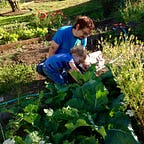What it’s like discussing GMOs on the Internet
I swear this happens like 85% of the time
ME: I have some concerns about GMOs and how it will impact our food systems.
PRO-GMO PERSON: Oh, you must be opposed to Science™.
ME: No, I’m fairly pro-science. I believe in vaccinations. I’m generally a fan of conventional medicine. I’m just concerned that the impacts of GMOs haven’t been researched enough, and that the motives behind their developments are profit-based, so we don’t know what will potentially develop as they become more and more widely used.
PRO-GMO PERSON: But they’re perfectly safe. Here are ONE HUNDRED RESEARCH PAPERS proving my point. Read them all.
ME: I don’t have the time or inclination to read one hundred papers on the subject.
PRO-GMO PERSON: Then you’re not qualified to talk about it.
ME: But it impacts the food that I grow and eat. You’re damn right that I’m going to be interested in talking about something that so directly impacts me and my family.
PRO-GMO PERSON: GOTCHA! If you grow food, you’re supporting GMO. After all, “cross-breeding changed teosinte into Corn™,” and cross-breeding is genetic manipulation, bro. You’re a hypocrite!
ME: Yes, but cross-breeding happens even without human intervention, outside of a lab, and our use of it has been over tens of thousands of years, so I’m pretty sure we know it’s relatively safe. That’s different than splicing genes together in a lab setting and allowing companies with profit-motives to control their implementation.
PRO-GMO PERSON: Why are you so opposed to Science™?
ME: Again, I’m not. I just have honest questions about whether or not this stuff has been studied enough.
PRO-GMO PERSON: But GMO foods might save the world’s food supply/help people in “developing countries” get the nutrition they need!
ME: The world has plenty of food. It just gets wasted, and subsumed by monocultural practices that destroy the local cultures who depend on traditional crops. Take quinoa, for example. It provides a full protein source, and was used as a staple in the Andes for tens of thousands of years. Then, it became trendy and companies from “developed” nations swooped in and turned it into a monoculture. Now the people who ate it traditionally can’t afford it any longer, and are suffering from protein deficiency. But, those same companies will be happy to sell those people corn, soy, and wheat.
Interestingly, quinoa as traditionally grown can theoretically be cultivated in plenty of places globally where protein deficiency is a problem. However, since only a few companies now have proprietory right to export it, and since “Big Ag” is spending a large proportion of their R&D dollars developing GMO corn, soy, and wheat, it’s not happening.
If you’re really concerned about nutrition in developing countries, why not support efforts to restore traditional agricultural practices instead of introducing proprietory GMOs like “Golden Rice” into areas where their impact on local culture and ecosystem is untested?
PRO-GMO PERSON: …Why are you so opposed to Science™? Here are ONE HUNDRED ADDITIONAL ARTICLES describing why GMOs are “perfectly safe.™”
ME: You know what else is “perfectly safe”? Growing an organic zucchini in your yard. To grow an organic zucchini in my yard, I plant a seed and take care of it in a particular fashion, and it grows, and I eat it (or save the seeds to plant next time). I just need a seed, some water, some soil, and the sun. I don’t need an “industry partner,” or a lab, or bacteria who will carry the genetic material, or any of this stuff:
Nor would I need any of that stuff if I wanted to teach somebody else to do it. The fact is, no matter how many research papers you throw at the subject, GM as an industry takes control out of the hands of people interested in growing their own food and forces their dependence upon a system based on profit-motives.
PRO-GMO PERSON: Here’s a chart I found online that refutes you. You’re an idiot who hates people and who must be a fan of Dr. Oz.
OK, now somebody do one from the other perspective!
When not building straw men or arguing with imaginary opponents, Jeremy Puma spends his time thinking about plant guilds and trying to come up with unique recipes using taro and cassava.
